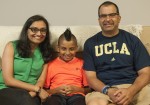Faculty-in-residence Rashmita Mistry feels like family to some of her students.
One of her residents, Tatev Papikyan, said Mistry was the first professor she formed a personal relationship with – something she didn’t expect on such a large campus.
“In community college I had very hands-on professors who put a lot of time into teaching, and when I got here I got the perception a lot of professors are (mostly) here for research,” said the fifth-year anthropology and gender studies transfer student and program coordinator for De Neve’s Acacia View and Birch Heights. “Dr. Mistry proved me wrong.”
Mistry has lived on the Hill for five years with her 10-year-old son Millen and her husband Kiran Mistry, outreach and community services manager for UCLA Recreation.
As part of her duties as a faculty-in-residence, Mistry has programmed events with student leaders on the Hill, including a program that brought low-income high school youth to visit UCLA and an event where students ate different kinds of curry while discussing culture.
She has also served as a mentor for the Posse Foundation, a college access and youth development program, a member of the Housing Appeals Board and a member of the Common Book selection committee.
Before she became a faculty-in-residence, Mistry spent 10 to 12 hours per week commuting to UCLA with her son. The commute was difficult, and getting Millen to class on time in rush-hour traffic left little time for the family to be together.
Mistry said trading a weekly commute for 10 to 12 hours of programming on the Hill was rewarding.
Anthony Padilla, a third-year English student and resident assistant in Rieber Hall who has programmed activities with Mistry, said the events she puts on center around social justice issues and help foster greater understanding of other cultures.
“If we’re going to live in a community that praises diversity, we have to be willing to learn about different kinds of people,” said Padilla. “Dr. Mistry’s work is about globalization and how we can move from cultural appropriation to cultural appreciation.”
Mistry said she goes on to have long-term professional relationships with many of the resident assistants and student leaders she programs events with.
“I have this ability to bring my professional life here and have it be connected and expanded in a way that just being a faculty member would not have allowed me to experience,” she said. “(Because of this) I have been very fortunate to be able to make connections with students I have met in different capacities as a faculty-in-residence.”
Beyond the benefits that come from developing relationships with student leaders on the Hill, the Mistry’s said life on the Hill presents exciting possibilities.
Kiran Mistry said their son doesn’t have any siblings to play with, but he regularly participates in basketball games with groups of students and residential events his wife plans.
Now that Millen is a bit older, his mother said she feels more comfortable giving him increased autonomy on the UCLA campus.
He looks up the dining hall schedules online so he can get his own meals, and is especially fond of Cafe 1919’s gelato, which he decided to get instead of a cake on his birthday.
While the Mistrys said they face some inconveniences on the Hill – such as early morning fire alarms and occasional noise disturbances at night from students, the experience of living on the Hill has been a positive one overall.
“The level of passion students have on campus is incredible,” Mistry said. “I’m reminded of the ‘we can do it’ attitude of youth, which has been rewarding to remember.”
